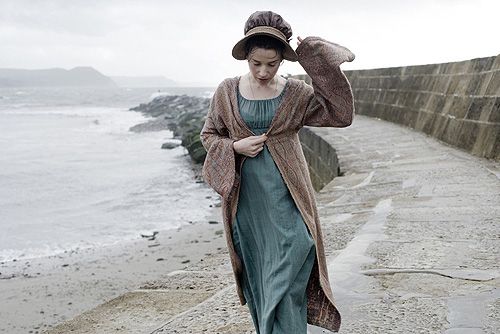Guest post by E.J., INTJ
Persuasion, Jane Austen

Dominant Si: The past is very important to Anne. Her close friendship with Lady Russell partially stems from Lady Russell’s connection to Anne’s mother, and Anne often goes to Lady Russell for advice. Anne also continues to love Wentworth nearly a decade after she broke off their engagement. While others do not always notice Anne’s intelligence, she is very perceptive and has a good memory for detail.

Auxiliary Fe: Anne is very concerned about others’ feelings and always puts others before herself. Unfortunately, her father and sisters–all demanding people–do not value her sweet nature. Anne is very perceptive of others’ needs: for instance, she understands Benwick’s emotional problems very well and realizes the negative impact his poetry reading is having on him. Anne is careful about being influenced by immature people, but those she respects have enormous power over her. Under Lady Russell’s persuasion, Anne breaks off her engagement to Wentworth, despite her deep love for him. Even after Anne rekindles her relationship with Wentworth and Lady Russell approves of their engagement, Anne continues to believe that obliging Lady Russell initially was the right thing to do, although Anne also is convinced that Lady Russell’s initial views were wrong.

Tertiary Ti: While Anne is strongly influenced by her past and her connections with other people, she is capable of thinking for herself. She recognizes her family’s inappropriate behavior and uses reason to think out a better framework for her own actions. As a result, Anne possesses an abundance of common sense. She finds it easier to take stringent measures to address her family’s financial situation than her self-absorbed father or sisters (although her strong Si makes living out these measures somewhat more difficult than she expected). Since Anne’s Fe function is much more obvious than her Ti, she sometimes surprises people who know her well. Wentworth, for instance, is impressed by the way Anne is able to cooly direct those around her to deal with Louisa Musgrove’s injury.

Inferior Ne: Anne is poor at generating new ideas. When she initially has to break off her relationship to Wentworth, she never moves on. Instead, she lives as she did before, still dreaming of Wentworth and wishing for what might have been. Fortunately, she is able to reconnect with him and live much as she had originally hoped.

Anne Elliott is definitely an INFJ. Her loyalty to Wentworth and inability to move on could just as easily be Ni-dom: commitment to her initial long-term vision for her life, combined with Fe-aux: very intense feelings. She couldn’t move on not because he was her first attachment (in fact she might have moved on to Mr. Elliot in different circumstances); it was because no one she encountered was as “perfect” at Frederick, a very common struggle for perfectionistic, quality-oriented INFJs. She couldn’t consider Charles as a viable option because of his strong S orientation–he didn’t read and preferred hunting and sports–traditional male country activities an SJ would have been much more comfortable with. When she did encounter another “high-quality” romantic opportunity, she was open to it and might have even married him if things hadn’t redeveloped with Wentworth and her own impeccable reading of Elliot’s character (Ni-Fe-Se) interrupted hte process. There’s a lot more evidence for her having dominant Ni and inferior Se. During a walk, she is closely in touch with the autumn landscape around her (Se), and relates it metaphorically (Ni) back to her own complex feelings about growing older and feeling her future closed off. Her interactions with Benwick illustrate her Fe orientation towards understanding other’s feelings and helping them, but they connect over N subjects: poetry and reading that features abstract reasoning. While she’s capable of helping with more Sensory needs, her primary orientation is towards the philosophical–how to help everyone achieve their potential–and people are constantly going to her to exert her influence over people to that end. She’s actually quite open to new ideas and willing to forgo tradition–much more so than her father and sister. She’s eager for them to give up all the traditional trappings of their wealth and nobility to “do the right thing”, a fairly NF way of thinking about it. She’s also eager to visit her old friend in reduced circumstances, even though this broke with more conservative tradition dictating behavior for women in her social class. Anne being an INFJ also explains her intense attraction to Wentworth (an ENTP).
LikeLike